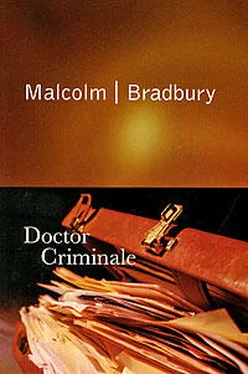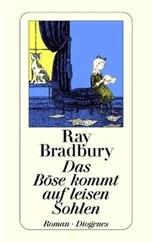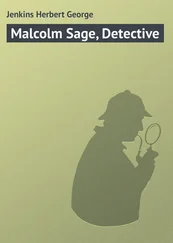Malcolm Bradbury - Doctor Criminale
Здесь есть возможность читать онлайн «Malcolm Bradbury - Doctor Criminale» весь текст электронной книги совершенно бесплатно (целиком полную версию без сокращений). В некоторых случаях можно слушать аудио, скачать через торрент в формате fb2 и присутствует краткое содержание. Город: London, Год выпуска: 2000, ISBN: 2000, Издательство: Picador, Жанр: Современная проза, на английском языке. Описание произведения, (предисловие) а так же отзывы посетителей доступны на портале библиотеки ЛибКат.
- Название:Doctor Criminale
- Автор:
- Издательство:Picador
- Жанр:
- Год:2000
- Город:London
- ISBN:978-0330390347
- Рейтинг книги:5 / 5. Голосов: 1
-
Избранное:Добавить в избранное
- Отзывы:
-
Ваша оценка:
- 100
- 1
- 2
- 3
- 4
- 5
Doctor Criminale: краткое содержание, описание и аннотация
Предлагаем к чтению аннотацию, описание, краткое содержание или предисловие (зависит от того, что написал сам автор книги «Doctor Criminale»). Если вы не нашли необходимую информацию о книге — напишите в комментариях, мы постараемся отыскать её.
Doctor Criminale — читать онлайн бесплатно полную книгу (весь текст) целиком
Ниже представлен текст книги, разбитый по страницам. Система сохранения места последней прочитанной страницы, позволяет с удобством читать онлайн бесплатно книгу «Doctor Criminale», без необходимости каждый раз заново искать на чём Вы остановились. Поставьте закладку, и сможете в любой момент перейти на страницу, на которой закончили чтение.
Интервал:
Закладка:
16
That should have been the end of the story of Criminale . . .
And that ought really to have been that – the end of the story of Bazlo Criminale. But of course if it were I should not have been writing this at all, and by the same token you would not have been reading it either. So what happened? Well, as it happens, just a few more small things, rather chaotic in nature, that did change the situation quite considerably. Soon after my Brussels trip, and in the confused and nonsensical midsummer of 1991, I moved over to work on the Sunday Times , a much more suitable home for those articles that connect everything up with everything else – art with money, sex with style, who’s in with what’s in – in which I was now beginning to specialize. Just a few weeks later there took place in Southern, Swabian Germany, the natural home for this sort of thing, a high-powered international seminar rather ambiguously entitled ‘The Death of Postmodernism: New Beginnings’. The event was to unfold at some small, upmarket archducal hunting lodge near Schlossburg, a spa town that was once the summer home of the Archdukes of Wurttemberg, in the days when Germany had been a series of federal principalities, or in other words an early European Community.
This captured the eye of my style editor, a very smart-thinking girl from Oxford and Cardiff who was shocked to her cleavage to discover that a whole major movement in art style and culture had been born, had flourished, and had now apparently dropped dead while she’d been keeping her eye on the fringe events of the Edinburgh Festival and the sex-life of the Royals. She wandered over to my desk in my yet more open open-plan office to consult me about it. She had attended some party the night before where someone – I believe it was Richard Rogers yet again – had told her that Postmodernism, or Po-Mo as he called it, had been in for some time and she had Better get into it before it was entirely out. As a result, she had conceived the exciting notion of an entire Po-Mo supplement, and she wanted to know if an article on the Schlossburg Seminar would make suitable fodder.
I glanced down the programme, and saw at once that it was an unmissable event. From all over Eastern Europe, writers, scholars and intellectuals, deprived for four decades of access to parody, pastiche, blank irony, narrative indeterminacy, new history, chaos theory, and late modern depthlessness, were being invited to make up the time-lag. Various far-sighted German industrial foundations, like Mercedes and Bosch, had put up the money to bring them to Schlossburg. Several of the great American postmodern writers, like John Barth and William Gass, Raymond Federman and Ihab Hassan, were to be hefted onto the virtual reality of transatlantic flights and brought in to lecture to them. Various leading European intellectuals and deconstructive thinkers would also come in to give lectures. One of these was none other than Professor Henri Mensonge, world-famous deconstructionist from the University of Paris XIII, famous for never making any personal appearances. Yet even Mensonge had consented to speak, on the topic of the Totally Deconstructed Self. It would be a remarkable occasion.
So when my style editor asked if it was all worth an article, I quickly said yes. I should have known better; by now I was older, wiser, indeed cleaner, and above all, during my quest for Criminale, I had had a glut of foreign conferences. But sure enough, two days later, I found myself strapped in at twenty thousand feet, complimentary g-and-t in one hand, on Lufthansa to Stuttgart, the nearest point of access to Schlossburg, with two thousand words of sparkle to write on the topic of What Happened to Po-Mo. And it was then, only then, that I had time to look at the Schlossburg programme properly: then that I saw I had overlooked the name of one of the great intellectual figures who was flying in to give a single keynote lecture. It will not surprise you in the least – though it did me – to learn that this was Doctor Bazlo Criminale.
I checked again; his name was definitely there. My heart sank; I had no wish, no wish at all, to meet the great man again. I was through and right out the other side of the quest for Bazlo Criminale. The evening (possibly more, but who knows?) I had spent with Cosima Bruckner in Brussels had finally settled the matter. Great hero he might be; moral disappointment he definitely was. He might have been more sinned against than sinning, but I knew now he had sinned too. He had betrayed himself and others; what’s more, in doing that he had somehow obscurely betrayed me. I had started out suspecting him; I had come round to admiring and valuing him; now I saw him as tainted again. Despite that, I had maintained my vow of silence. I wrote nothing about him, and I wished to write nothing now.
Each day when I opened the newspapers I half-expected to find something; new revelations, sudden exposures – the papers were full of that kind of thing. But there was nothing, except for more of those glitzy and somehow old-fashioned articles about how famous he was for his fame. Vanity Fair showed him as guest of honour at some thousand-dollar-a-plate dinner for the world’s starving, held at the Westin Bonaventure in LA; beside him, cloven down to the midriff, was Valeria Magno. I knew it would only be a matter of time before the big news came. Perhaps the great and the good, the rich and the powerful, the publishers and the proprietors, had decided to spare him; but they themselves were going down, one by one. Still, there was nothing either about Otto Codicil; some manage to look after their own. But I wanted no responsibility, no encounter; sitting up there in Europe’s crowded airways, I began planning ways of foreshortening my visit and so avoiding him. Then I realized this would simply be another of those truly flying visits in which he specialized. He would be here today and gone tomorrow, if not the same night. If, like Ildiko in Lausanne, I remained in the background while he was in the foreground, he would not, in his famed philosophical abstraction, even recognize me. Reassured, I shifted my mind to a far more difficult late modern problem: unpackaging the shrinkwrapped airline food on the tray in my lap.
Soon I was landing at Stuttgart, city of Schiller and Hegel, Mercedes-Benz and Bosch. A strange foetid heatwave had fallen across Southern Germany all that summer, no doubt thanks to the universal atmospheric pollution that was beginning to cloud the entire world. Car fumes flickered in the urban air, sticky heat hung in the pedestrianized streets, clothes filled with sweat. Following my brief, I crossed the city through its great squares and well-stocked commercial passages, and found my way to the famous postmodern Staatsgalerie (britische Architekt) , James Sterling’s sloping sandstone building, a tease of hidden entrances and shifted hierarchies. A Malaysian bride in white, gown thrown high above her thighs, sat astride a Henry Moore statue for her nuptial photographs. Inside, where I hovered for a while in front of the frantic moderns, Nolde and Kirschner, wealth and art sat easily side by side. I talked to a reverential guide who explained to me that everything in the building was the quotation of a quotation, the pastiche of a pastiche, and then I went outside to find a taxi to take me to Schlossburg.
It was a long, expensive ride, out of the booming post-industrial city and out into the Swabian countryside, but I was on expenses. Economic-miracle-unified Germany looked as economic-miracle-unified Germany does: very neat. The streets of Stuttgart, old and new locked firmly together, were neat. The new towns spreading out endlessly over the hillsides were neat. The grey concrete shopping centres rising everywhere were neat. The wealthy, solid Swabian villas were neat. The well-tilled fields were neat. The long strips of vineyard that descended down the steep banks of the River Neckar were definitely neat. The Autobahns were neat (and packed); the cars were neat (and expensive); the people were neat (and well-dressed). When I got to the small town of Schlossburg, with its great baroque palace and its formal French gardens, all was neat. And when I reached the Gothic romantischer hunting lodge on a craggy hill in wild woods over a deep cleft of river, even that wilderness was neat too.
Читать дальшеИнтервал:
Закладка:
Похожие книги на «Doctor Criminale»
Представляем Вашему вниманию похожие книги на «Doctor Criminale» списком для выбора. Мы отобрали схожую по названию и смыслу литературу в надежде предоставить читателям больше вариантов отыскать новые, интересные, ещё непрочитанные произведения.
Обсуждение, отзывы о книге «Doctor Criminale» и просто собственные мнения читателей. Оставьте ваши комментарии, напишите, что Вы думаете о произведении, его смысле или главных героях. Укажите что конкретно понравилось, а что нет, и почему Вы так считаете.











